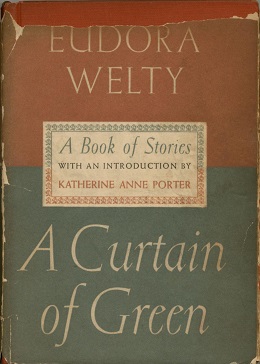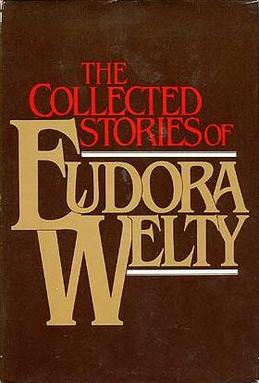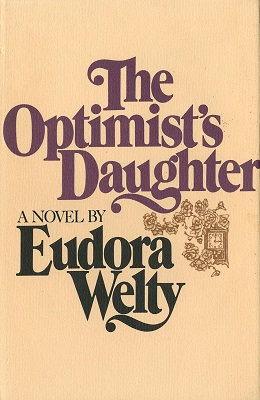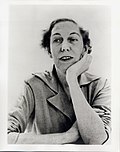
Eudora Alice Welty was an American short story writer, novelist and photographer who wrote about the American South. Her novel The Optimist's Daughter won the Pulitzer Prize in 1973. Welty received numerous awards, including the Presidential Medal of Freedom and the Order of the South. She was the first living author to have her works published by the Library of America. Her house in Jackson, Mississippi has been designated as a National Historic Landmark and is open to the public as a house museum.

Eudora is a family of email clients that was used on the classic Mac OS, Mac OS X, and Microsoft Windows operating systems. It also supported several palmtop computing platforms, including Newton and the Palm OS.

Intruder in the Dust is a 1948 crime novel written by American author William Faulkner. Taking place in Mississippi, it revolves around an African-American farmer accused of murdering a Caucasian man.

The Robber Bridegroom is a 1942 novella by Eudora Welty.

A Curtain of Green was the first collection of short stories written by Eudora Welty. In these stories, Welty looks at the state of Mississippi through the eyes of its inhabitants, the common people, both black and white, and presents a realistic view of the racial relations that existed at the time. Welty, though, looks past race, not overtly focusing on the subject, and sees Mississippi as what it is. The stories subtly combine myth and reality to create portraits of odd, but undeniable, beauty. One of the finest pieces in the collection is titled "A Worn Path." Welty's skill as a writer perhaps reaches its finest point with this story of an aging woman who faces her greatest obstacle, the journey of life as she tries to cope with the grief from the death of her grandson she goes through a journey comparable to a Greek epic. Full of challenges that she had to overcome while still keeping her dignity. Welty writes "A Worn Path" to show the reader that even though they are not an epic hero they can still have dignity in their life.

The Collected Stories of Eudora Welty is a collection of short stories by American penner Eudora Welty, first published by Houghton Mifflin in 1980. Its first paperback edition won the 1983 National Book Award for Paperback Fiction.
The American Collection was a spinoff series of Masterpiece Theater, which ran from 2000 to 2003, for the former series' 30th anniversary. It was funded originally by Exxon Mobil ; however, funding for both series was withdrawn in 2005. It aired on PBS. This was a widely acclaimed limited run program.

The Optimist's Daughter is a Pulitzer Prize for Fiction-winning short novel by Eudora Welty. It was first published as a long story in The New Yorker in March 1969 and was subsequently revised and published in book form in 1972. It concerns a woman named Laurel, who travels to New Orleans to take care of her father, Judge McKelva, after he has surgery for a detached retina. Judge McKelva fails to recover from this surgery, and as he dies slowly in the hospital, Laurel visits and reads to him from Dickens. Her father's second wife, Fay, who is younger than Laurel, is a shrewish outsider from Texas. Her shrill response to the Judge's illness appears to accelerate his demise. Laurel and Fay are thrown together when they return the Judge to his hometown, Mount Salus, Mississippi, where he will be buried. There, Laurel is immersed in the good neighborliness of the friends and family she knew before marrying and moving away to Chicago. Fay, though, has always been unwelcome and leaves for a long weekend, leaving Laurel in the big house full of memories. Laurel encounters her mother's memory, her father's life after he lost his first wife, and the complex emotions surrounding her loss as well as the many memories. She comes to a place of understanding that Fay can never share, and she leaves small town Mississippi with the memories she can carry with her.
The Rea Award for the Short Story is an annual award given to a living American or Canadian author chosen for unusually significant contributions to short story fiction.

"A Worn Path" by Eudora Welty is a short story about an elderly African American woman who undertakes a familiar journey on a road in a rural area to acquire medicine for her grandson. She expresses herself, both to her surroundings and in short spurts of spoken monologue, warning away animals and expressing the pain she feels in her weary bones.

The Eudora Welty House & Garden, at 1119 Pinehurst Street in Jackson, Mississippi, was the home of author Eudora Welty for nearly 80 years. It was built by her parents in 1925. Welty and her mother built and tended to the garden located at the side and back of the home over decades. Welty could often be found writing in her bedroom or on the porch, which frequently hosted her peers in writing. The house was first declared a Mississippi Landmark in 2001, added to the National Register of Historic Places in 2002, and declared a National Historic Landmark in 2004.

One Writer's Beginnings is a collection of autobiographical essays by Eudora Welty. The book is based on three lectures she delivered at Harvard University in April 1983, as part of the William E. Massey Sr. lecture series. The three essays are entitled: Listening, Learning to See, and Finding a Voice. Well received by both critics and fans alike, One Writer's Beginnings was on The New York Times bestseller list for almost a year.

"Why I Live at the P.O." is a short story written by Eudora Welty, American writer and photographer. It was published in her collection of stories named A Curtain of Green (1941). The work was inspired by a photograph taken by Welty that depicts a woman ironing at the back of a post office. The story is classified as an example of Southern realism. "Why I Live at the P.O." is one of Welty's most popular and frequently anthologized stories.

Delta Wedding is a 1946 Southern fiction novel by Eudora Welty. Set in 1923, the novel tells of the experiences of the Fairchild family in a domestic drama-filled week leading up to Dabney Fairchild's wedding to the family overseer, Troy Flavin, during an otherwise unexceptional year in the Mississippi Delta.

The Shoe Bird is a 1964 children's novel by Southern writer Eudora Welty. The novel tells the story of a parrot in a shoe store, as he talks to other birds about shoes. Welty, who had never written any children's literature before, wrote it to satisfy a contractual obligation with her publisher Harcourt Brace and to pay for a new roof on her house.

Losing Battles is the last novel written by Eudora Welty. It was released on April 13, 1970. Its setting is two days—a Sunday and Monday morning—in a 1930s farm in Mississippi. It was her first novel to make the best seller lists, to Welty's surprise.
JohnRobert Ferrone was an American book editor. He edited The Collected Stories of Eudora Welty and The Color Purple.

The Golden Apples is a short story collection with seven stories written by Eudora Welty, first published in 1949. The stories form an interrelated cycle, which explores the economic and social plight of the fictional Morgana Mississippi: “Shower of Gold”; “June Recital”; “Sir Rabbit”; “Moon Lake”; “The Whole World Knows”; “Music from Spain” and “The Wanderers.”
The literature of Mississippi, United States, includes fiction, poetry, and nonfiction. Mississippi has a literary tradition that arose from a diverse mix of cultures and races. Traditional themes from this genre of literature lean towards the past, conflict and change, and southern history in general; however, in the modern era, work have shifted towards deeply Southern works that do not rely on these traditional themes.
"Lily Daw and the Three Ladies" is a short story written by American writer, Eudora Welty. It is included in Welty's first collection of short stories A Curtain of Green. Critics have found it possible for Welty to have been influenced by fairy tales, folklore and or nursery rhymes when writing this story, as there are elements of each within this piece. "Lily Daw and the Three Ladies" is speculated to fit anywhere in the classification system from grimly comedic to documentary realism or literary allegory.













